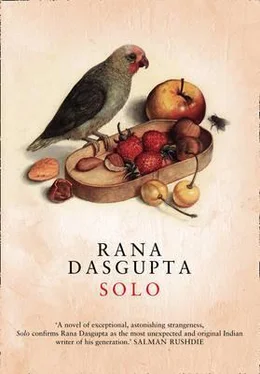There is more than a hint of sadism in the curiosity that stalks the chatter; there are those present who in the excitement of the evening have surrendered themselves to an inconceivable temptation, who have edged beyond the landmass of political prudence in order to prod the fantasy — incredible as it seems — of seeing the leader squirm. They ask about the implications of the bad harvest, the second in a row, and surely a challenge for the entire bloc? There is talk of the cutbacks in oil exports and the resulting disaffection in East Germany, Hungary, Czechoslovakia … A toast to Comrade Chernenko … They discuss the hijacking in Bulgaria, the French election, the Afghan war. Willi Brandt and Ronni Reagan. They move on to the troubling issue of Romanian debt.
Everything is observed with a combination of disdain and reluctant excitement by a woman with onyx hair who smokes her cigarettes through a holder. She is the wife of a prominent young party member who is currently exchanging glances with her every time Comrade Brezhnev opens his mouth. She claims descent from one of Georgia’s ancient royal families and has been known to sign ‘Princess’ before her name; she admires spirit and excess, and harbours only contempt for the cheap suits, the sycophantism and the cult of impersonality around her. But this is not like other party gatherings: tonight she senses something unfamiliar which arouses her interest. There is Brezhnev, of course: pathetic absence of a man whose astonishing position in the world is somehow (she has drunk not a little) beautiful and tragic — how can one not be moved by the discrepancy between this wilted figure and his epic office? There is his grey-eyed apprentice, whose razor youth eclipses every other man in the room with body and poise. But there is something else as well. She drinks more, the better to sense it. There is the romance of chaos. The delight of seeing petty men panic over the crisis of their system . The tremulous voices that understate cataclysmic things in the name of decorum. But there is still something more, something she has never realised before tonight, something new in the eyes of the party men who now hang on Brezhnev’s words with a heady mixture of public fear and private ambition. For the first time, she has seen bloodlust in these bloodless men. It is a revelation. Her spirit rises and she is glad; and there are bloodwings beating in her own organs. While they talk with concerned faces about the spread of the Polish counter-revolutionary contagion, while they drink with unusual gusto out of respect for their Russian guests, she smokes greedily and allows her mind to conjure scenes of stubbled heads banging on the glass wall of the future, giant fronds waving against the sky, and underground seas of lava heaving with grandiose slowness on a fantastic vortex.
Brezhnev announces his departure. It is still early, but the old man needs his rest. The woman is only vaguely aware of the Russians’ exit, and yet it is now that the night spills forth. They drink toasts to their guests in absentia , and review the highlights of the evening’s conversation. There are sweaty moustaches still constrained by neckties, and there are the beautiful necks of women. One man sings and another seeks to recruit the gathering to his chant of Dinamo Tbilisi and then there is a joke not for the ladies: the men gather, crouch headed and wheezy, with the voices low and the sniggers premature, and the story proceeds in starts till he gets to the punch; he stands up broad-faced, shouting, If I were a gentleman I would marry her! , laughing laughing crying with cheeks upon the table and even her husband is doubled up, his vodka glass the only vertical thing about him. She watches him as time sweeps them into oblong orbits and the senior party members begin to depart. She can drink no more and wants to escape these insignificant men; she demands her coat and wrestles her husband from his stupidity, Let’s go! Let’s go! , and though he is reluctant he hurries after her, grabbing some last ham from the table, down the corridor to the elevator whose attendant smiles, closing the grille, and in the mirror they are green night creatures with shining pitted faces and her folded arms find her own skin above her skirt. They land weightlessly and the grille crashes open again and the evening breeze is in the lobby the smell of the river and the city and they flow liquid into the limousine. The night is shut out with the car door and there is only her jealous tussle. She does not even like to make love to this man who is so unromantic in his soul but now, now! she pulls it from him and he is drunk, lost to it, holding the back of the seat fucking on cobbled streets and they are turning corners driver grabbing mirror glances she deep in herself, his tie swinging pestilence in her eyes headlights in his face laughing red in the night city thrusting into the corner and things turn breathing matter circumference diving axis she sees houses shapes depth out of the window they are reaching home now, now! the car stops and stills with engine silent and night seeping into the car and the driver sits endless immobile looking straight ahead as if the loud fucking is not behind his very head and she shouts out,
‘Keep driving, you imbecile!’
Nine months later, the woman gave birth to a baby girl, and named her Khatuna.
4
AS A YOUNG GIRL, Khatuna loved secret things. She had a secret name for herself that no one else knew. Her mother called her my treasure , and she smiled at the notion of a hidden wealth whose value is only to itself. For special occasions she donned outfits that had once belonged to great characters from literature, but she did not reveal their provenance. She liked the secret her mother had told her, that deep down she was a princess.
There was in the house an old box with a lock, which she took for herself. Accessible only with her key, her personal relics could breathe there safely and in silence. The box was of her, yet outside her, and so it offered the prospect of solemn reunions.
When she turned the lock and lifted the lid, the spirits of this box flowed into her. She fingered the objects entombed there: two glass marbles given to her by an important man; an ivory crucifix she had stolen from her mother’s bedroom; a picture of a beautiful woman, cut from a magazine; a lock of her own hair, tied up with silk; an instruction booklet for a radio which looked impressively official, like a passport; and a dead beetle of stunning iridescent green, mounted on a glass slide, which she had once asked her father to buy for her in an antique shop.
When she was four years old she gained a baby brother named Irakli. She loved him immediately, and, far from jeopardising her realm of secrets, his arrival promised to double its size and appeal. As he grew old enough to understand, she drew him in under the mantle of her world, revealing to him her secret name and showing off her box of relics. He responded fervently, full of admiration for everything she had worked out during her short head start on earth. He fancied she was another half of himself, carelessly separated before birth, and he plotted how they would be joined again.
She had a blue cloak she sometimes used to put on. It made her walk very upright, with her lips pursed to look like a princess. She also had a blue teddy bear that she endlessly stroked and cuddled. And there was another thing: the pen around which she clenched her early, gawky writing hand was blue.
Observing all this, the young Irakli one day took a paintbrush and painted blue over his penis, in the hope it would become another of her playthings. He emerged into her bedroom naked, glistening blue paint daubed even on his stomach and thighs, his blue infant penis wagging with expectation.
Читать дальше
Конец ознакомительного отрывка
Купить книгу












